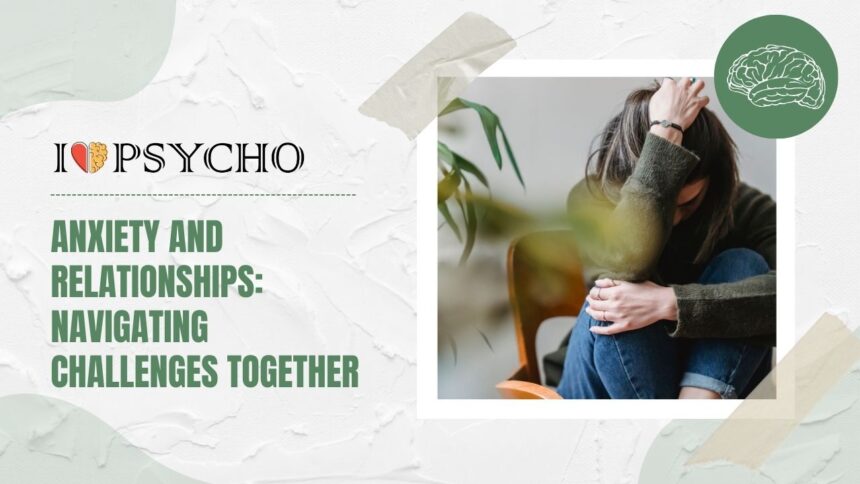Introduction to Anxiety and its Impact on Relationships
Welcome to a deep dive into the intricate dance between anxiety and relationships. Picture this: you’re navigating the waters of love, but there’s a storm brewing beneath the surface – anxiety. How does it impact your connection with your partner? How can you weather the challenges together? Join us as we unravel these questions and explore ways to strengthen the bond amidst turbulent times.
Understanding and Communicating About Anxiety with Your Partner
Navigating the complexities of anxiety within a relationship can be challenging but crucial for maintaining a strong bond. Understanding your partner’s anxiety involves active listening and empathy. It’s important to create a safe space where they feel comfortable expressing their thoughts and feelings without judgment.
Communicating openly about anxiety can help build trust and intimacy in the relationship. Encourage your partner to share their triggers, fears, and coping mechanisms with you. Validate their emotions and let them know that you are there to support them through it all.
Avoid trying to ‘fix’ your partner’s anxiety; instead, focus on being a supportive presence. Use nonverbal cues like physical touch or gestures of affection to show understanding during times of distress. By fostering open communication and empathy, you can strengthen your connection while navigating the challenges that anxiety may bring into your relationship.
Coping Strategies for Partners of Those with Anxiety
Living with a partner who struggles with anxiety can be challenging at times. It’s important to remember that you are not alone in this journey and there are coping strategies that can help both you and your partner navigate through difficult moments.
It’s crucial to educate yourself about anxiety and its symptoms. Understanding what your partner is going through can create empathy and strengthen your bond. Encourage open communication where both of you feel safe expressing emotions without judgment or criticism.
Practice patience and compassion towards your partner. Small gestures of kindness, like offering a listening ear or a comforting hug, can make a significant difference. Remember to take care of yourself as well – self-care is vital in maintaining a healthy relationship dynamic.
Seek support from friends, family, or even therapy if needed. Having someone to talk to about your own feelings and experiences can provide much-needed perspective and relief. Together, with understanding and resilience, you can overcome the challenges that anxiety may bring into your relationship.
Supporting Your Partner Through Difficult Times
Supporting your partner through difficult times can be a challenging but essential aspect of any relationship. It’s important to create a safe space where your partner feels heard and understood without judgment. Offering reassurance and validation can go a long way in helping them feel supported.
Encouraging open communication allows both partners to express their feelings and concerns openly. Active listening plays a crucial role in showing empathy and building trust within the relationship.
Finding ways to help alleviate stress, whether it’s through small gestures or acts of kindness, can make a significant impact on your partner’s well-being. Being there for them during tough moments shows that you’re committed to navigating challenges together as a team.
Remember that everyone copes with difficulties differently, so being patient and understanding is key. By standing by your partner’s side through thick and thin, you are strengthening the foundation of your relationship while fostering deeper emotional connections.
Seeking Professional Help for Relationship Challenges
When facing relationship challenges aggravated by anxiety, seeking professional help can be a crucial step in navigating the complexities of these situations. A trained therapist can provide valuable guidance and tools to improve communication, strengthen emotional connection, and work through underlying issues that may be contributing to the strain on the relationship.
Therapy offers a safe space for both partners to express their feelings openly and honestly, with the support of a neutral third party who can offer insights and strategies for moving forward constructively. A qualified therapist can help couples develop healthier coping mechanisms, set boundaries, and cultivate empathy towards each other’s struggles.
By investing time and effort into therapy sessions, couples affected by anxiety-related challenges can gain a deeper understanding of themselves and each other while learning how to navigate obstacles together more effectively. Professional guidance can empower partners to build stronger foundations for their relationship based on trust, respect, and mutual support.
Strengthening the Bond in a Relationship Affected by Anxiety
Navigating a relationship affected by anxiety can be challenging, but it’s essential to cultivate understanding and empathy. Building a strong bond requires patience, active listening, and open communication.
Acknowledging your partner’s struggles with anxiety and offering unwavering support can help strengthen the trust between you. Remember that anxiety is not a choice; it is a mental health condition that needs compassion and reassurance.
Creating a safe space where both partners feel comfortable expressing their emotions without judgment is crucial for fostering closeness. Encouraging each other to practice self-care routines and coping mechanisms can also deepen the connection in the relationship.
Finding activities or hobbies that you both enjoy and that promote relaxation can be beneficial in relieving stress and promoting bonding moments. By facing challenges together as a team, you reinforce your unity and resilience as a couple.
Remember, strengthening the bond in a relationship takes time, effort, and understanding from both partners. Patience, love, and mutual respect are key ingredients in overcoming obstacles caused by anxiety within the relationship.
Communication Strategies for Couples Affected by Anxiety
Effective communication is vital when navigating the complexities of anxiety within a relationship. It’s crucial for partners to create a safe and open space for discussing feelings and concerns. Listening attentively, without judgment or interruption, can help foster understanding and empathy between both individuals.
Using “I” statements instead of blaming language can prevent misunderstandings and defensiveness. Expressing thoughts and emotions clearly while being mindful of each other’s triggers is key to maintaining a healthy dialogue. Setting aside dedicated time for honest conversations about anxiety can strengthen the bond between partners.
Non-verbal communication, such as gestures and eye contact, can also convey support and reassurance during moments of distress. Remember that active listening involves not just hearing words but showing genuine interest in your partner’s experiences.
Seeking therapy together to improve communication skills may be beneficial in overcoming challenges related to anxiety in relationships. By prioritizing effective communication strategies, couples can build trust, deepen their connection, and navigate through difficulties with resilience.
Conclusion
Navigating anxiety in relationships can be challenging, but with understanding, communication, and support, it is possible to strengthen the bond between partners. By being open about anxiety, practicing coping strategies together, and seeking professional help when needed, couples can work through difficulties and grow closer as a result. Remember that patience, empathy, and reassurance are key components in supporting a partner with anxiety. With dedication and effort from both individuals involved, relationships affected by anxiety can not only survive but thrive. So let love be the guiding force in overcoming challenges together.









